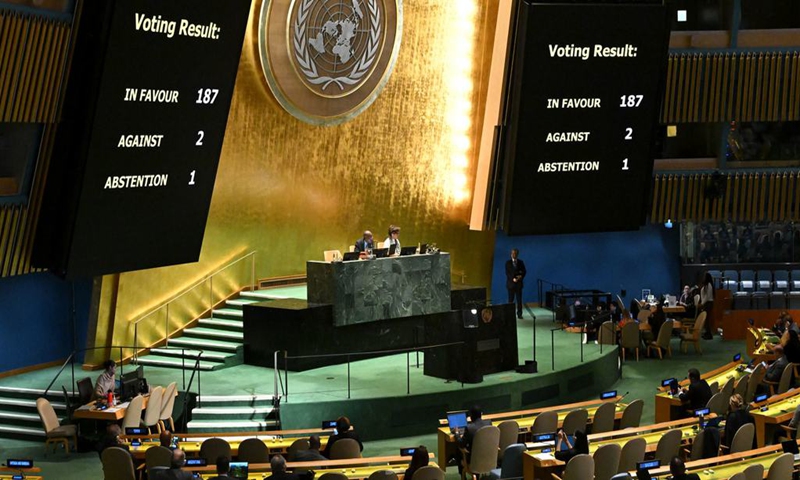
UN General Assembly on October 30, 2024 votes on the draft resolution on the necessity of ending the economic, commercial and financial embargo imposed by the US against Cuba. Photo: UN website
The United Nations General Assembly (UNGA) on Wednesday local time once again urged the US to end its embargo on Cuba, renewing a demand it has made annually since 1992.
The resolution titled "Necessity of ending the economic, commercial and financial embargo imposed by the United States of America against Cuba" passed with 187 votes in favor, with only the US and Israel against it and one abstention by Moldova, according to the UN website.
Chinese Foreign Ministry spokesperson Lin Jian said on Thursday that "Once again the UNGA adopted relevant resolution with an overwhelming majority of 187 votes, demonstrating firm support to the Cuban people for their just effort to safeguard sovereignty and oppose external interference and blockade."
It shows that the US's unilateral and bullying moves, which seriously violate the purposes and principles of the UN Charter, have been met with overwhelming condemnation and firm opposition of the international community, Lin said at the regular press briefing on Thursday.
China as always opposes US's blockade and sanctions on Cuba. Since 1992, for 32 consecutive times, China has voted in support of Cuba's resolution calling for an end to the blockade imposed by the US at the UNGA. China will stand firm on the side of international fairness and justice and continue to support the Cuban people in standing against external interference and blockade and defending sovereignty and national dignity, Lin noted.
Such overwhelming support demonstrates that the voices of justice are increasingly standing with Cuba, while the US' bullying and unilateral sanctions imposed on the country are becoming increasingly unpopular, even among the US' allies, said Pan Deng, director of the Latin American and Caribbean Region Law Center at China University of Political Science and Law.
Though non-binding, the result highlighted the US' relative isolation regarding the embargo, which was first imposed in 1960. The resolution reaffirmed, among other principles, the sovereign equality of states, non-intervention and non-interference in their internal affairs and freedom of international trade and navigation, according to the UN official release on the vote.
Bruno Rodriguez Parrilla, Cuba's Minister for Foreign Affairs, strongly condemned the US embargo against Cuba at the assembly, calling it "commercial warfare" and "a crime of genocide," according to the UN official website on Wednesday.
According to Lin, the US's continued unilateral coercive measures against Cuba have brought profound sufferings to the Cuban people. According to data from Cuba, US blockade over the past six decades and more has caused over US$160 billion of loss to Cuba, of which, over US$5 billion was lost between March 2023 and February 2024, affecting almost all livelihood areas, including food, medicine, fuel and energy.
Being geographically adjacent to the US, Cuba's economy, trade and even foreign exchange acquisition are all inevitably and greatly impacted by it, and the current severe social and economic hardship Cuba is facing is a direct result of US' sanctions, Pan told the Global Times on Wednesday.
Parrilla recalled how from 18 to 23 October Cuban families had no electricity, except for maybe a few hours. "Many Cuban families lacked running water; hospitals worked under emergency conditions, schools and universities suspended their classes; [and] businesses interrupted their activity," he said.
Since 2019, the US has adopted harsher "economic warfare" measures designed to prevent the supply of fuel and spare parts needed to maintain Cuba's power plants and electric grid, according to the UN website.
The reality of Cuban people's suffering, directly caused by the embargo imposed by the US, has been a complete rejection of so-called human rights and justice trumpeted by the US, Pan said.
Argentina was one of 187 countries that supported the non-binding UN resolution on Wednesday. It was the first time since Argentine President Javier Milei's arrival in office that the country has not aligned itself with the US and Israeli governments, the BBC reported. Milei has reportedly sacked his foreign minister, Diana Mondino, after the country voted in favor of the UN resolution.
In recent years, international community has witnessed rising unilateral actions and bullying behavior. Against this backdrop, the resolution reflects a unified voice from the mainstream international community, reflecting that bullying and sanctions are unpopular and unwelcome, Pan noted.




